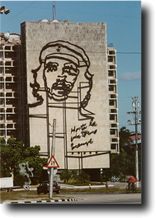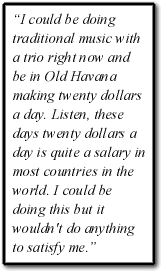|
|
|
 |
| "I don't provide solutions, but am rather a kind of sniper. I | |||||
| feel like a sniper when I am composing my music. From my | |||||
| fairly comfortable position, I shoot at whatever I want." ---- Frank Delgado, Singer-songwriter | |||||
 |
|||||||
| Frank Delgado | |||||||
| Singer-Songwriter | |||||||
|
|||||||
|
Another recurring theme. For many Che Guevara is a symbol of hope and commitment. In the United States Che's image is commercialized, on everything from t-shirts to Taco Bell commercials. Has anything similar transpired here? Why do you sing about Che? Frank Delgado - If Che were alive and knew the extent to which he was used as a cult figure and an object by capitalism he would probably die all over again. But in the case of Cuba there hasn't been this kind of sudden "Chemanía," because a form of it has always existed. Here there has always been a very |
 |
||||||
|
special treatment given to the figure of Che. In elementary school the slogan of the Pioneers is "¡Pioneros por el comunismo - Seremos como el Che!" (To build Communism - We will be like Che!). At times they say it like automatons. Some are able to internalize better what Che was all about. For me, Che was a very special person. You'll never hear me beating him down. He did what very few people do: put his life on the line for an idea in which he strongly believed. Maybe I'm not the kind of guy to give so much of myself. I would not be the one to go to Bolivia to make a revolution. I wouldn't be the one to go to Africa to make a revolution. I probably wouldn't have even left Argentina. I would have stayed there in Rosario and wouldn't have done anything but just be a normal guy. But in any event, to us normal folks Che is an example, is he not? He is loved in Cuba by people on the left, people who consider themselves to be progressive. He is hated and vilified by people who don't share the ideas of the left. Then there are some who say he was a murderer, others who say he was a robber. Some say he was the last romantic of this century, others a very utopian type. Perhaps in my case what he leaves behind are certain romantic things, utopias, dreams. The idea that maybe we have some options, and that these ideas are not quite yet dead. In this pragmatic and commercialized world symbolized by money, a big dose of utopian ideas can serve as a kind of venom for people to provide a little bit of balance and equilibrium to their lives. |
|||||||
|
Do you consider yourself a revolutionary? Frank Delgado - Sure. I always learned that a revolutionary is someone who is dynamic, who is immersed in a process. I believe that I am a revolutionary in various aspects. Not in my music, because I have never invented anything. But as a person, I feel bothered by injustice. I’m always wanting to turn the screws a little bit more. In my treatment of my work I have a sense of solidarity with people, but not out of feelings of charity. I believe in social justice, and part of my artistic life speaks to issues of injustice. |
||
 |
Now, if you ask me if I believe in the essence of the Cuban Revolution, yes, I still believe in this. But we could have been more visionary and avoided being faced with the rather brutal shock of capitalism without having prepared ourselves adequately for it. We have relied at times on certain formulas which have not worked and which have caused our people to lose their sense of creativity. Now, when we have dedicated ourselves to something heart and soul we have achieved many things. In sports, culture and medicine, for example. Although generally speaking folks aren’t sick year around. People want more than just sports, medicine and culture. | |
|
How is your music received by Cubans? Frank Delgado - By luck, both of my CDs, Trova-Tur and La Habana Está de Bala were recorded here a little over a year apart in the same auditorium in front of Cuban audiences, and you can feel their presence in the recordings. The public is like a thermometer, a kind of active dictionary in case I don't understand something they're saying or are concerned about. If they laugh at things I say, then I guess I'm being funny. The public is an active dictionary for people who don't know Cuban reality. But in the first place, I sing songs because I like them myself. If folks don't like some of my songs that's life. But if I don't like one of my songs then I am not going to perform it. If people like it, and I like it, then that's double satisfaction. I try to be objective, profound and cultured. In this struggle one continues on for ever. No one ever knows how the "fourth wall" - the public - will respond. Lately I have had a lot of success with the public. Some day they may give me the cold shoulder. That's the way things are. The public is a mystery. |
|||||||
|
Do you have any special message for people in the United States? Frank Delgado - Well, apart from the best-known Cuban music, which is dance music, there is a one hundred year old school here called the Trova Cubana. It's very alive, and it includes representatives who are maybe a little bit younger than Silvio Rodríguez and Pablo Milanés. We are making our own history. We draw audiences here in Cuba. We have not had a lot of luck selling records on the market, but I hope that people are able to open their hearts and listen to us some day. And also, that I have the opportunity to visit the United States. For me, the U.S. was always painted as a bad place. You know, when some cousin of mine would leave for the States I would be saying "You poor thing, think what could happen to you there!" (Laughs) I hope that my material can be played on the radio there. I would really like a chance to perform there. Performances for me are like the act of communion. When I get up on stage, I seem like a priest because I talk so much! More than a cantautor (singer-songwriter) I can be a hablautor ("talker-writer.") And I definitely want to perform in the U.S. |
|||||||
| HOME | CUBANIA! | ABOUT CUBA | ARTIST INTERVIEWS | LINKS | EMAIL | |||||||
|
For more on Frank Delgado, including song lyrics, visit his website at http://www.geocities.com/SunsetStrip/Backstage/1815/frank.html For audio of Frank Delgado songs, check out http://www.geocities.com/SoHo/Cafe/8694/index.html |
|||||||